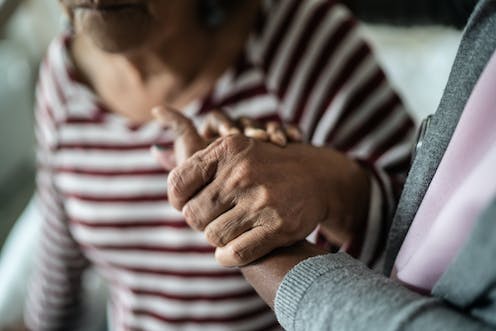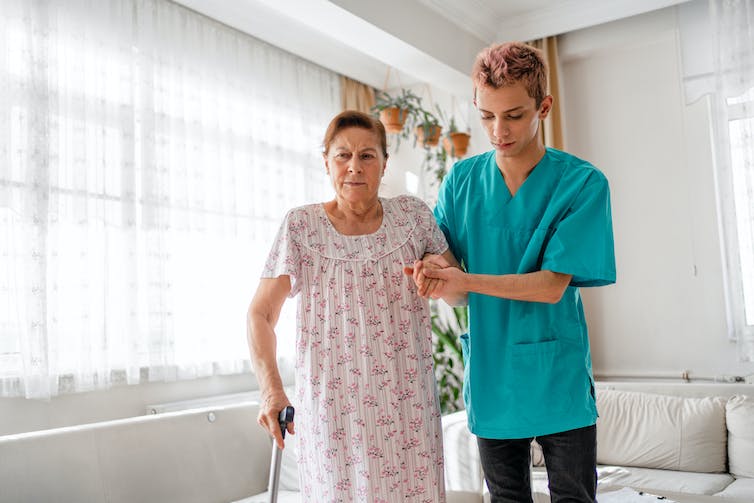
Caring for someone living with dementia can be a stressful experience that harms the physical and mental health of caregivers. Many caregivers experience depression and lower quality of life. LGBTQ+ caregivers face unique challenges that can magnify these strains.
Around 8% of the estimated 50 million-plus caregivers of adults or children with special needs in the U.S. identify as LGBTQ+, with many caring for someone living with dementia. LGBTQ+ caregivers have experienced discrimination, isolation, stigma and other stressors related to their sexual orientation or gender identity and generally have poorer physical and mental health than non-LGBTQ+ caregivers. Yet existing programs and services, such as caregiver support groups and respite services, do not account for their unique needs.
As a researcher exploring the health effects of caring for someone living with dementia, I am interested in developing strategies to alleviate strain on caregivers and improve their quality of life. Because of limited research on LGBTQ+ caregivers of people living with dementia, my team and I have been collecting data to address the health disparities they experience. Understanding how sexual orientation and gender identity affect the lives of caregivers can help tailor services and programs to support their health.
Table of Contents
LGBTQ+ caregivers by the numbers
In our study, we asked 415 caregivers – 286 of whom were LGBTQ+ – to complete an online survey consisting of questions about their health and caregiving experiences. Gay, lesbian, bisexual, queer and transgender caregivers were represented, with over 40% of LGBTQ+ respondents identifying as gay men.
The majority, nearly 80% of LGBTQ+ caregivers, were white, while over a third identified as Latino. The majority of the LGBTQ+ caregivers, ranging in age from 21 to 72, were millennials ages 38 or younger. Half of the LGBTQ+ caregivers were the spouse or partner of the person with dementia, and a tenth were caring for an unrelated friend.
Overall, LGBTQ+ caregivers were significantly younger and more racially and ethnically diverse than their non-LGBTQ+ counterparts.

Phynart Studio/E+ via Getty Images
LGBTQ+ caregivers were also more likely to be working full or part time, to have never married, and to be caring for their friends or “chosen” family. In contrast, non-LGBTQ+ caregivers were more likely to be retired and caring for their spouse.
Despite relatively high levels of income among LGBTQ+ caregivers overall, lesbian and bisexual caregivers experienced significantly higher levels of difficulty in paying for everyday basics, and queer caregivers more frequently reported incomes of less than US$30,000.
Caregivers who were lesbian or queer – an umbrella term for people who are not heterosexual – more likely needed to travel to provide care, while bisexual caregivers more frequently resided with their care recipients.
Higher stress
LGBTQ+ caregivers may be experiencing higher levels of stress than non-LGBTQ+ caregivers because they seek out supportive services less frequently. The need to disclose their sexual orientation or gender identity to service providers and support groups increases the potential risk for discrimination, microaggressions, stigma and being outed.
We found that 75% of LGBTQ+ caregivers of people with dementia reported moderate to high levels of perceived stress, and 78% experienced depressive symptoms. These negative health effects were significantly associated with experiences of microaggressions, discrimination and stigma related to their gender identity or sexual orientation in their everyday lives.
Given the diversity of experiences among LGBTQ+ caregivers, different identities experienced different types of caregiving strain. For example, bisexual and queer caregivers experienced higher stress than those with other identities. Queer caregivers also experienced higher levels of depressive symptoms.
Importantly, caregivers of all LGBTQ+ identities met the criteria for probable clinical depression and had significantly higher mean depressive symptom scores than those of non-LGBTQ+ caregivers.
Queer caregivers and caregivers who experienced more microaggressions reported poorer family quality of life, defined as a sense of well-being of the family. Gay male caregivers reported the highest levels of caregiver stigma. Racial minority LGBTQ+ caregivers also reported poorer family quality of life and higher levels of depressive symptoms.
We also asked caregivers for general feedback about their experiences overall and whether they found it difficult to answer any of our questions. Several caregivers found that questions about family lacked nuance. “Some of my family is very supportive, but many family members are actively hostile and unhelpful,” one participant shared. Many caregivers emphasized the distinction between biological and chosen family.
These comments echo those from other studies on LGBTQ+ caregivers of people with Alzheimer’s disease. Many shared that they often experience isolation, financial strain, lack of support and connection, and stigma and discrimination.
An understudied problem
Our findings suggest that there are statistically and clinically significant differences in the physical and mental health of LGBTQ+ caregivers as compared with non-LGBTQ+ caregivers. But further research is necessary to understand how the stress of being an LGBTQ+ person and the stress of being a caregiver interact with each other. In 2018, the National Institute on Aging funded only seven studies focused on LGBTQ+ aging.
To address the underrepresentation of LGBTQ+ caregivers in aging research, my colleagues and I started the RISE Project. Our goal is to recruit LGBTQ+ caregivers of people living with dementia and memory loss in communities around the nation to get them involved in research.
Bolstered by recognition from the National Institutes of Health and National Academies of Science, Engineering, and Medicine that further study is needed, more researchers are studying health inequities among LGBTQ+ people.
A better understanding of the experiences of LGBTQ+ caregivers is a key step toward programs, policies and services that support their well-being.
![]()
Joel G. Anderson receives funding from the National Institute on Aging of the National Institutes of Health. The content is solely the responsibility of the authors and does not necessarily represent the official views of the NIH. He is affiliated with Healing Beyond Borders.
























